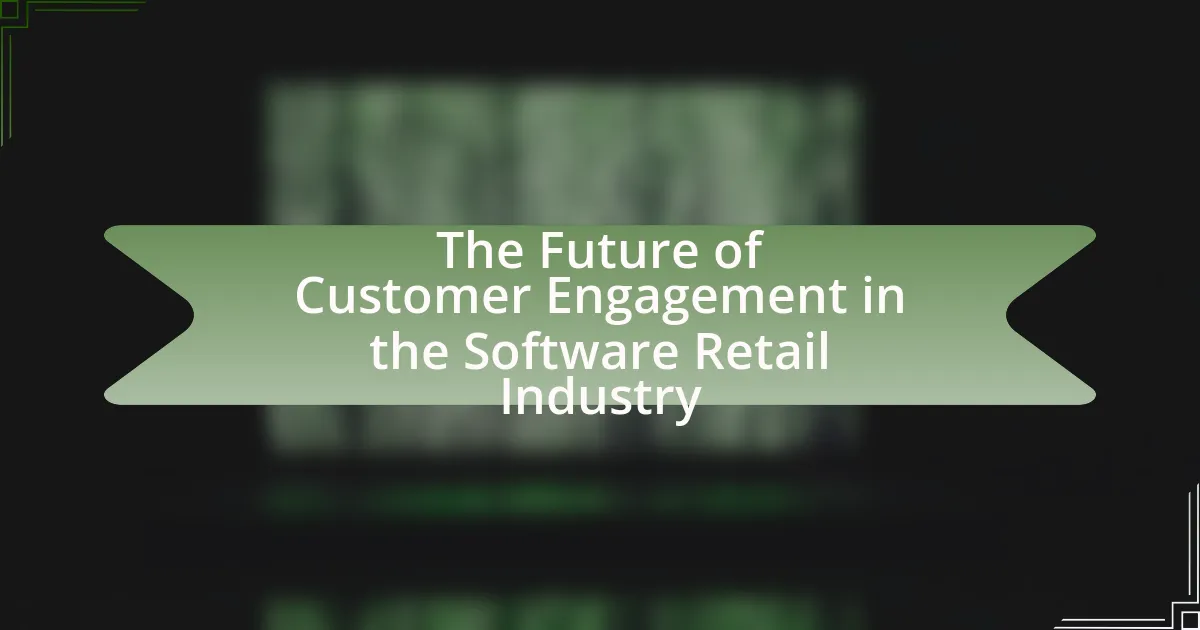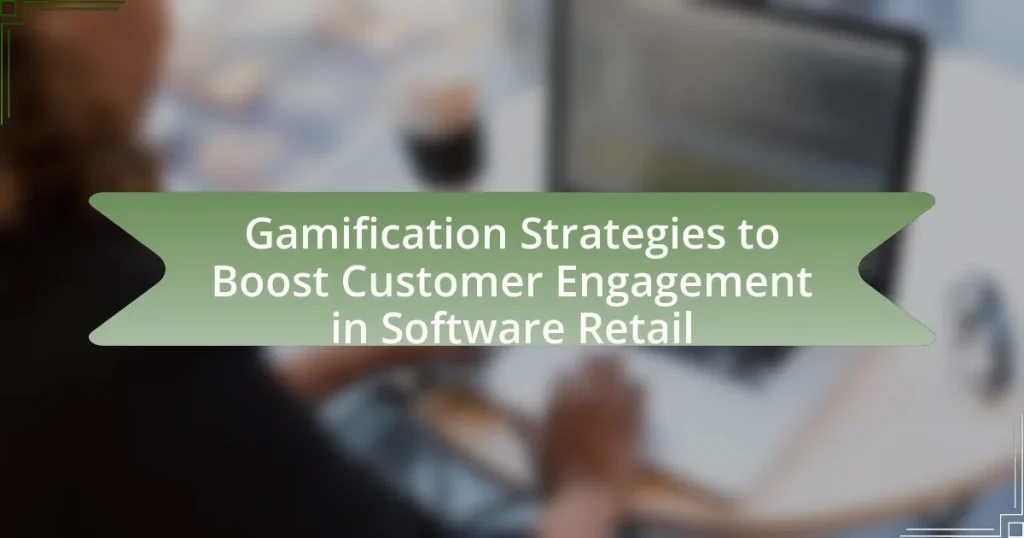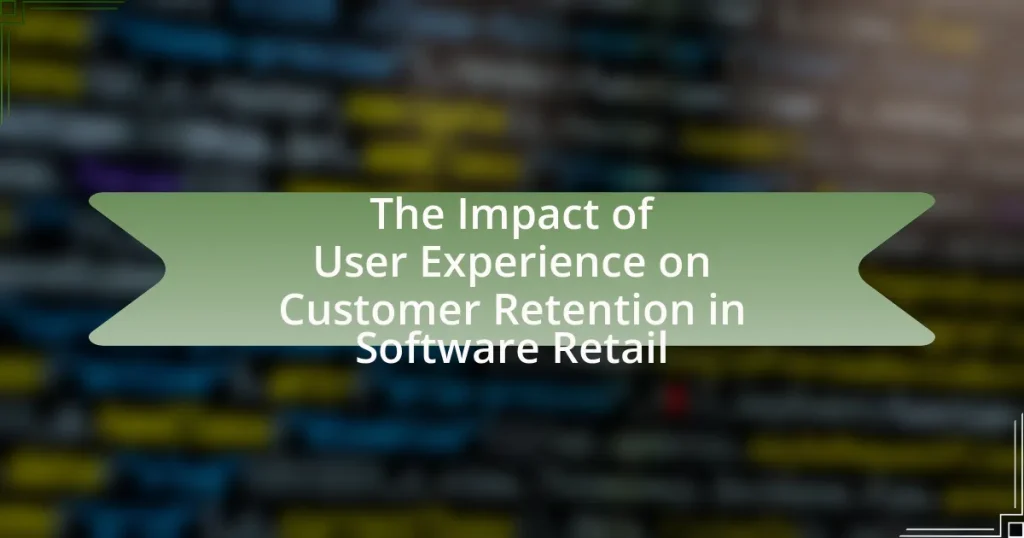The article focuses on the future of customer engagement in the software retail industry, emphasizing the role of personalized experiences driven by advanced data analytics and artificial intelligence. It outlines how these technologies enable real-time analysis of customer behavior, leading to tailored recommendations and targeted marketing strategies. Key trends such as omnichannel engagement, the impact of consumer expectations, and the importance of effective communication are discussed, highlighting their influence on customer loyalty and sales. Additionally, the article examines the challenges retailers face in maintaining engagement and offers practical strategies for improvement, including the use of data analytics and feedback loops.
What is the Future of Customer Engagement in the Software Retail Industry?
The future of customer engagement in the software retail industry will increasingly rely on personalized experiences driven by advanced data analytics and artificial intelligence. As software retailers adopt AI technologies, they will be able to analyze customer behavior and preferences in real-time, allowing for tailored recommendations and targeted marketing strategies. According to a report by McKinsey, companies that excel in personalization can achieve up to 10-30% more revenue than their competitors. Furthermore, the integration of omnichannel strategies will enhance customer interactions across various platforms, ensuring a seamless experience. This shift towards data-driven personalization and omnichannel engagement is expected to redefine customer relationships and drive loyalty in the software retail sector.
How is customer engagement evolving in the software retail sector?
Customer engagement in the software retail sector is evolving through increased personalization, enhanced digital interactions, and the integration of artificial intelligence. Personalization is driven by data analytics, allowing retailers to tailor experiences based on individual customer preferences and behaviors. Enhanced digital interactions, such as live chat support and social media engagement, facilitate real-time communication, fostering stronger relationships. The integration of artificial intelligence enables predictive analytics, helping retailers anticipate customer needs and streamline the purchasing process. These trends are supported by research indicating that 80% of consumers are more likely to make a purchase when brands offer personalized experiences, highlighting the importance of evolving engagement strategies in the software retail sector.
What technological advancements are driving changes in customer engagement?
Technological advancements such as artificial intelligence, machine learning, chatbots, and data analytics are driving significant changes in customer engagement. These technologies enable businesses to personalize interactions, predict customer behavior, and provide real-time support. For instance, AI-driven analytics can analyze vast amounts of customer data to tailor marketing strategies, resulting in a 20% increase in customer retention rates, as reported by a study from McKinsey & Company. Additionally, chatbots enhance customer service efficiency by handling inquiries 24/7, leading to a 30% reduction in response times, according to research by Gartner. These advancements collectively transform how companies engage with customers, making interactions more efficient and personalized.
How do consumer expectations influence engagement strategies?
Consumer expectations significantly shape engagement strategies by dictating how businesses interact with their customers. High consumer expectations compel companies to adopt personalized communication, timely responses, and seamless experiences across platforms. For instance, a study by Salesforce found that 70% of consumers say connected processes are very important to winning their business, highlighting the necessity for businesses to align their engagement strategies with consumer demands for consistency and personalization. This alignment not only enhances customer satisfaction but also fosters loyalty, as consumers are more likely to engage with brands that meet or exceed their expectations.
Why is customer engagement important for software retailers?
Customer engagement is crucial for software retailers because it directly influences customer loyalty and retention. Engaged customers are more likely to make repeat purchases, which is essential in a competitive market where customer acquisition costs are high. According to a study by Bain & Company, increasing customer retention rates by just 5% can lead to an increase in profits of 25% to 95%. This demonstrates that fostering strong relationships through effective engagement strategies not only enhances customer satisfaction but also significantly boosts profitability for software retailers.
What impact does effective engagement have on sales and customer loyalty?
Effective engagement significantly enhances sales and customer loyalty. When businesses actively interact with customers through personalized communication and tailored experiences, they foster a deeper emotional connection, leading to increased purchase frequency and higher customer retention rates. Research indicates that companies with strong customer engagement strategies can see revenue growth rates of 10% to 20% higher than their competitors. Furthermore, a study by Gallup found that highly engaged customers are 23% more likely to make repeat purchases. This correlation underscores the importance of effective engagement in driving both sales and loyalty in the software retail industry.
How does customer engagement affect brand perception in the software industry?
Customer engagement significantly influences brand perception in the software industry by fostering trust and loyalty among users. Engaged customers are more likely to share positive experiences, which enhances the brand’s reputation and attracts new users. According to a study by Gallup, companies with high customer engagement levels outperform their competitors by 147% in earnings per share, demonstrating the financial impact of strong customer relationships. Furthermore, engaged customers often provide valuable feedback that can lead to product improvements, further solidifying their positive perception of the brand.
What are the key trends shaping customer engagement in software retail?
Key trends shaping customer engagement in software retail include personalization, omnichannel experiences, and the use of artificial intelligence. Personalization allows retailers to tailor recommendations and communications based on individual customer preferences and behaviors, enhancing the overall shopping experience. Omnichannel experiences ensure that customers can interact with brands seamlessly across various platforms, whether online or in-store, which is crucial as 73% of consumers prefer shopping across multiple channels. The integration of artificial intelligence enables retailers to analyze customer data more effectively, providing insights that drive engagement strategies and improve customer service. These trends collectively enhance customer satisfaction and loyalty in the competitive software retail landscape.
How are personalization and customization changing customer interactions?
Personalization and customization are transforming customer interactions by creating tailored experiences that enhance engagement and satisfaction. These approaches allow businesses to analyze customer data and preferences, enabling them to deliver relevant content, product recommendations, and targeted marketing strategies. For instance, a study by McKinsey & Company found that personalized experiences can lead to a 10-15% increase in sales and a 20% increase in customer satisfaction. This shift towards individualized interactions fosters stronger relationships between customers and brands, ultimately driving loyalty and repeat business.
What tools are available for implementing personalized customer experiences?
Tools available for implementing personalized customer experiences include Customer Relationship Management (CRM) systems, data analytics platforms, and marketing automation software. CRM systems like Salesforce enable businesses to track customer interactions and preferences, allowing for tailored communication. Data analytics platforms, such as Google Analytics, provide insights into customer behavior, helping to refine personalization strategies. Marketing automation software, like HubSpot, facilitates targeted campaigns based on customer data, enhancing engagement. These tools collectively empower businesses to create customized experiences that resonate with individual customers, ultimately driving loyalty and sales.
How does data analytics enhance personalization efforts?
Data analytics enhances personalization efforts by enabling businesses to analyze customer data and tailor experiences based on individual preferences and behaviors. By leveraging data analytics, companies can segment their audience, identify trends, and predict future behaviors, allowing for targeted marketing strategies. For instance, a study by McKinsey & Company found that companies using advanced analytics for personalization can achieve a 10-20% increase in sales. This demonstrates that data-driven insights lead to more relevant customer interactions, ultimately improving engagement and satisfaction.
What role does social media play in customer engagement?
Social media plays a crucial role in customer engagement by facilitating direct communication between brands and consumers. This platform allows companies to interact with customers in real-time, fostering a sense of community and loyalty. According to a 2021 report by Sprout Social, 64% of consumers want brands to connect with them on social media, highlighting its importance in building relationships. Additionally, social media enables businesses to gather feedback and insights, which can inform product development and marketing strategies, further enhancing customer engagement.
How can software retailers leverage social media for better engagement?
Software retailers can leverage social media for better engagement by creating targeted content that resonates with their audience. This involves understanding customer preferences and utilizing platforms like Facebook, Twitter, and LinkedIn to share relevant updates, promotions, and educational resources. For instance, a study by Sprout Social found that 70% of consumers feel more connected to brands with a strong social media presence, highlighting the importance of consistent interaction. Additionally, engaging with customers through comments, direct messages, and user-generated content fosters a sense of community and loyalty, which is crucial for long-term success in the software retail industry.
What are the risks and rewards of engaging customers on social platforms?
Engaging customers on social platforms presents both risks and rewards. The rewards include increased brand visibility, enhanced customer loyalty, and direct feedback that can inform product development; for instance, 54% of consumers prefer to engage with brands on social media, indicating a strong potential for relationship building. Conversely, the risks involve negative public feedback, potential brand reputation damage, and the challenge of managing customer expectations in real-time; a study by Sprout Social found that 70% of consumers expect a response from brands within 24 hours, which can strain resources if not managed effectively.
How can software retailers improve their customer engagement strategies?
Software retailers can improve their customer engagement strategies by leveraging personalized marketing techniques. Personalization enhances customer experiences by tailoring content, recommendations, and communications based on individual preferences and behaviors. Research indicates that 80% of consumers are more likely to make a purchase when brands offer personalized experiences, highlighting the effectiveness of this approach. Additionally, utilizing data analytics allows retailers to gain insights into customer behavior, enabling them to refine their engagement strategies further. By implementing these methods, software retailers can foster stronger relationships with their customers, ultimately driving loyalty and sales.
What best practices should be adopted for effective customer engagement?
Effective customer engagement can be achieved by adopting personalized communication, utilizing data analytics, and fostering community interaction. Personalized communication enhances customer experience by tailoring messages and offers to individual preferences, which studies show can increase customer loyalty by up to 20%. Utilizing data analytics allows businesses to understand customer behavior and preferences, enabling targeted marketing strategies that can improve engagement rates significantly. Additionally, fostering community interaction through social media platforms and forums encourages customers to share experiences and feedback, creating a sense of belonging and increasing brand loyalty. These practices are supported by research indicating that engaged customers are 23% more likely to make repeat purchases.
How can feedback loops enhance customer engagement efforts?
Feedback loops enhance customer engagement efforts by facilitating continuous communication between businesses and customers, allowing for real-time adjustments to products and services. This iterative process enables companies to gather insights on customer preferences and behaviors, which can lead to improved customer satisfaction and loyalty. For instance, a study by Bain & Company found that companies that actively seek customer feedback can increase customer retention rates by up to 25%. By implementing feedback loops, businesses can not only respond to customer needs more effectively but also foster a sense of community and trust, ultimately driving higher engagement levels.
What training is necessary for staff to improve customer interactions?
Effective training for staff to improve customer interactions includes communication skills training, product knowledge enhancement, and conflict resolution strategies. Communication skills training equips employees with the ability to engage customers effectively, fostering a positive interaction environment. Product knowledge enhancement ensures that staff can provide accurate information and recommendations, which builds customer trust and satisfaction. Conflict resolution strategies prepare employees to handle difficult situations calmly and effectively, minimizing customer dissatisfaction. Research indicates that companies investing in comprehensive training programs see a 24% increase in customer satisfaction scores, demonstrating the direct impact of training on customer interactions.
What common challenges do software retailers face in customer engagement?
Software retailers commonly face challenges in customer engagement such as maintaining personalized communication, managing customer expectations, and adapting to rapidly changing technology. Personalized communication is crucial as customers increasingly expect tailored interactions; however, many retailers struggle to gather and analyze customer data effectively. Managing customer expectations is another challenge, as software products often come with complex features that can lead to confusion and dissatisfaction if not communicated clearly. Additionally, the fast pace of technological advancements requires retailers to continuously update their engagement strategies, which can be resource-intensive and difficult to implement. These challenges highlight the need for software retailers to invest in robust customer relationship management systems and training to enhance their engagement efforts.
How can retailers overcome barriers to effective engagement?
Retailers can overcome barriers to effective engagement by leveraging data analytics to understand customer preferences and behaviors. By utilizing advanced analytics tools, retailers can gather insights that inform personalized marketing strategies, enhancing customer interactions. For instance, a study by McKinsey found that companies using data-driven personalization saw a 10-15% increase in sales. Additionally, investing in training staff to improve communication skills can foster better customer relationships, as effective communication is crucial for engagement. Research from the Harvard Business Review indicates that companies with well-trained employees experience higher customer satisfaction rates, which directly correlates with improved engagement.
What strategies can be implemented to address customer disengagement?
To address customer disengagement, companies can implement personalized communication strategies. Personalization enhances customer experience by tailoring messages and offers based on individual preferences and behaviors, which has been shown to increase engagement rates. For instance, a study by Epsilon found that 80% of consumers are more likely to make a purchase when brands offer personalized experiences. Additionally, utilizing feedback loops through surveys and direct communication can help identify disengagement causes, allowing businesses to adapt their strategies effectively. Implementing loyalty programs that reward consistent engagement can also incentivize customers to remain active, as evidenced by a report from Bond Brand Loyalty, which states that 79% of consumers are more likely to continue doing business with brands that have a loyalty program.
What are the future predictions for customer engagement in the software retail industry?
Future predictions for customer engagement in the software retail industry indicate a significant shift towards personalized experiences driven by advanced data analytics and artificial intelligence. As software retailers increasingly leverage AI technologies, they will be able to analyze customer behavior and preferences in real-time, allowing for tailored recommendations and targeted marketing strategies. According to a report by Gartner, 80% of organizations that invest in personalization will see an increase in customer engagement metrics by 2025. Additionally, the integration of omnichannel strategies will enhance customer interactions across various platforms, ensuring a seamless experience. This trend is supported by a study from McKinsey, which found that companies with strong omnichannel engagement retain 89% of their customers compared to 33% for those with weak engagement.
How will emerging technologies like AI and VR influence customer engagement?
Emerging technologies like AI and VR will significantly enhance customer engagement by providing personalized experiences and immersive interactions. AI algorithms analyze customer data to tailor recommendations and communications, leading to increased satisfaction and loyalty. For instance, a study by McKinsey found that companies using AI for personalization can see a 10-30% increase in revenue. Meanwhile, VR creates immersive environments that allow customers to experience products in a virtual space, which can lead to higher conversion rates; research from PwC indicates that 75% of consumers prefer to shop in VR environments. Together, these technologies transform how customers interact with brands, making engagement more dynamic and effective.
What shifts in consumer behavior should retailers anticipate?
Retailers should anticipate a significant shift towards online shopping and increased demand for personalized experiences. This change is driven by consumers’ growing preference for convenience and tailored offerings, as evidenced by a 2022 survey indicating that 70% of shoppers prefer personalized recommendations based on their shopping history. Additionally, the rise of mobile commerce, with 54% of online sales occurring on mobile devices, highlights the need for retailers to optimize their digital platforms. As consumers become more environmentally conscious, retailers should also prepare for a demand for sustainable products, with 66% of global consumers willing to pay more for sustainable brands.
What practical tips can software retailers implement for better customer engagement?
Software retailers can enhance customer engagement by implementing personalized marketing strategies. Personalization increases customer satisfaction and loyalty, as studies show that 80% of consumers are more likely to make a purchase when brands offer personalized experiences. Retailers can utilize customer data to tailor recommendations, promotions, and communications, ensuring that customers feel valued and understood. Additionally, integrating interactive customer support channels, such as live chat and chatbots, can provide immediate assistance, further improving engagement. Research indicates that 73% of consumers prefer to communicate with brands through multiple channels, highlighting the importance of accessibility in customer interactions.



